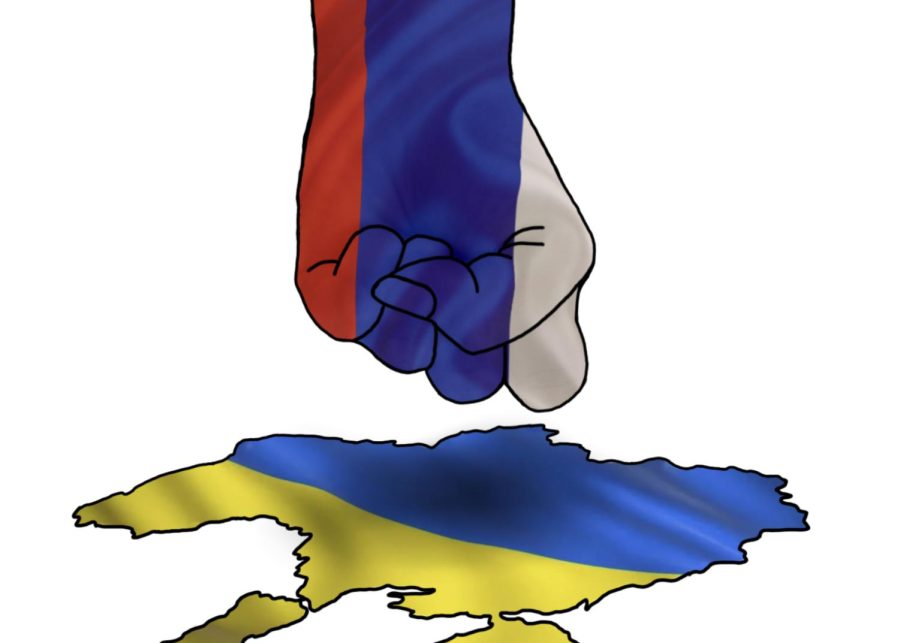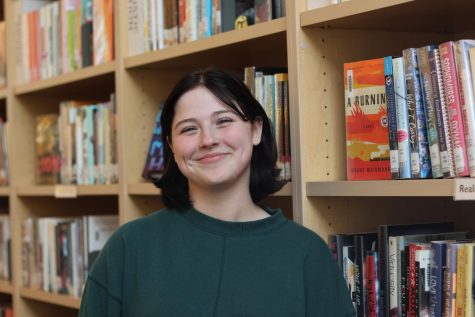“Democracy Is on the Line”: Lasallians Respond As Conflict Rages On Between Russia and Ukraine
Despite conversations seemingly dying down about the Russo-Ukraine conflict, “the Ukrainian people are still hurting right now,” junior Veronika Gunther said.
April 27, 2022
Following the beginning of Russia’s invasion of Ukraine in late February, the conflict has continued to make major headlines across the globe, quickly becoming a massive topic of discussion.
Talk of the war in Ukraine has subsequently entered the halls and classrooms of La Salle, spurring feelings of sadness, anxiety, and horror among students and staff alike.
“It’s tragic,” social studies teacher Mr. Alex Lanaghan said. “I think it is still kind of almost unbelievable, too — the fact that in 2022, we have this type of aggression and this type of force being used on one country from another.”
Despite the fact that there have been a plethora of other wars in the last few decades, Mr. Lanaghan believes that the war in Ukraine is most comparable to World War II — especially seeing as the mobilization of military forces in Ukraine has been noted as being the largest in Europe since that of World War II — and the Cold War.
“I think this is a great reminder about the importance of learning our history,” Mr. Lanaghan said. “There’s so many lessons here about the Cold War, about North Atlantic Treaty Organization, and about World War II, about aggression and appeasement, and so I always tell students that this is why we need to study history. And here we’re seeing it happening in real life.”
For some students, the ongoing conflict between Russia and Ukraine — or anything about Ukraine at all — was far from on their radar before the current warfare became highly publicized, and later found its way to La Salle.
Junior Shae McNaughton, who first learned about the conflict while he was scrolling through Twitter, said that he didn’t know much at all about Ukraine or the existing struggle before he heard of the recent events. “I mean, I knew that it was a country,” he said. “But I didn’t really know, I don’t know, the president or anything.”
For others, discussions in La Salle classrooms were the first time that they had been introduced to the situation. Sophomore Cadence Wooden, who is taking Speech & Debate with social studies teacher Mr. Michael Doran, said that she first heard about the assault on Ukraine during one of his classes. “I don’t watch the news much at home, so it’s nice to learn about it,” she said.
And, on top of the time that Mr. Doran has dedicated each class to discussing the crisis in Ukraine, Wooden said that discussions surrounding the conflict often transcend the walls of her social studies classroom. Her religion class, for example, also contributes to the conversation through prayer on behalf of Ukraine.
This is not an uncommon occurrence at La Salle, according to junior Sid Lefranc, who said they have heard more about it in their attendance of Ms. Lisa Moran’s Honors Spanish 4 class than in their social studies class, saying that Ms. Moran “just wanted [the class] to know what was going on.”
Utilizing the pre-existing curriculum of both his United States Government course and his World History 2 course, Mr. Pete Snow has been able to connect that material to the conflict in Ukraine and, thus, spark conversations with his students about it on a few occasions. With specific units on U.S. foreign policy in one class and also the roots, rise, and requirements of democracy in the other, Mr. Snow saw these subjects as ample opportunities to also jump into the current events with Ukraine and Russia — something he views as a form of action.
“I think part of it is having that conversation and delving into the issues and making folks kind of realize what’s going on [and] what’s the history of it,” Mr. Snow said.
Conversations are not the only thing that the war has brought to La Salle. For some students, it has brought immense sadness and stress, as the fighting — while thousands of miles away — hits close to home.
Hearing talk of the war on Ukraine has contributed to both anxiety and comfort for sophomore Lisa Safina, who recently transferred to La Salle in the fall. She moved to the U.S. from Russia, where she was born to Ukrainian parents.
“Teachers are saying ‘we want to pray for Ukraine,’ and I’m like, ‘good, thank you, I really, really appreciate it,” Safina said. “But at the same time, I just don’t want to think about it,” since many of her family members live in Ukraine.
Every day she hears chatter about the happenings between Russia and Ukraine at La Salle, Safina said. And while she appreciates all the support she has received from teachers and other students, she remembers her experience at school differing greatly when news of the invasion of Ukraine initially broke out just months ago, which she described as “the most stressful days [of] my life.”
On her first day at school after having heard the news of Russia’s invasion of Ukraine, Safina remembers a prayer being dedicated to Ukraine that day. “I’m like, ‘Are you kidding me?’ I just came to the school to not think about it,” she said.
Safina also remembers talk of the conflict being a popular hallway conversation and how she became afraid of how others might perceive her in light of her association with her home country.
“Nobody knows that I’m Ukrainian, but everybody knows that I’m from Russia,” Safina said. “So what [will people] think about me now?”
Veronika Gunther, whose mom is from Russia and whose family is part Ukrainian, remembers first hearing of the attack on Ukraine after seeing the news one night — something her family is doing frequently nowadays. A large portion of her family lives in a part of Russia that is very close to the Ukrainian border — so close that she said they could hear the gunfire on the other side.
“I’ve heard a lot,” Gunther said about how often conversations about the conflict come up in her social and religious studies classes. “They’ve been talking about it, and I think it’s important…they’re doing a really good job of explaining everything.”
Apart from simply talking about the situation in Ukraine in classrooms, the La Salle community’s efforts have gone as far as donating a portion of the art program’s annual art sale profits toward aid and action for Ukraine.
“Normally those dollars go to a different organization, and this year, the students felt passionately that that’s where those dollars should go,” Mr. Lanaghan said. “So I feel like that’s a great example of what La Salle is all about…recognizing these types of global crises and taking whatever action steps we can to help alleviate that. So that’s where I feel like our role is.”
Lefranc, who said they purchased multiple items from the sale, said that they were “really happy with it,” and “just really wanted to support any way I could.”
Primarily student-led discussions were an everyday occurrence in class at the beginning of the current conflict, Mr. Lanaghan said, but for the past few weeks, the enthusiasm has been curbed as it became apparent to him and his students that the war was going to be a long-term ordeal. “It just kind of became part of the background, unfortunately,” he said. “In the last couple of weeks, it’s more me being like, ‘Hey, remember, this is still happening?’”
Mr. Snow views La Salle’s talk of the war in Ukraine as not only being in alignment with portions of his particular class’ curriculum but also with the five Lasallian principles advertised on large banners in the main hallway.
“I think as you walk underneath the banners every day, and you reflect on the meaning of those and what’s happening,” Mr. Snow said, “I think if you’re going to be, as one of the banners talks about, overcoming injustice…we cannot have our head in the sand on issues that are tough topics that need to be talked about if we are actually going to try to make those banners a reality.”
Gunther also emphasized how La Salle’s values might contribute to these conversations. “I feel like we need to keep it in our heart and mind and maybe even start some more conversations about that,” Gunther said. “I think we have a responsibility as citizens of the world to promote peace…we are a Catholic school. Shouldn’t we [be] representing our core values or respect to all people? Shouldn’t we be doing that?”







brooklyn chillemi • Apr 27, 2022 at 10:25 pm
!! great article, lillian!
thank you to those who shared for being brave about your thoughts during this time!
Yelena • Apr 27, 2022 at 9:47 pm
Hello everyone,great discussion here and i would like to make a comment.
My name is Yelena ,I am immigrant
from Ukraine ?? 27 years ago,Ukraine was only 3 years young of separation from Soviet Union.
I know very well how life was in Soviet Union and how was being seperated.
It was New birth for my Country of Ukraine,it like fresh air after the Spring rain.It was great relief of Freedom .
Ukrainian People work hard and for 30 years they did very well economically with few up and downs due to unfaithful Presidents ,that put harm on Ukrainian people.But despite all odds Ukraine ?? did very well .
But unfortunately their life’s has been changed on 2-24-2022 ,the evil step in and destroyed and more in details what happened I think you already know.
Here is my point ,we should never support this kind of evil behavior,we should stand against it,we should never argue or put blame on any one.
I believe its Not Russian people that create this ,its the man and his name we’ll known is Putin ,His evil manipulative power ,long time planning such a war against innocent human kind.
Jealousy is a very evil thing.
We know that God will punished such a behavior ,no one never can’t escape his Judgment.
We should united in Christ not divided because you are Russian and another individual is Ukrainian.Be United,be Loving, caring ,sensitive ,forgiving each other, have heart ❤️ to help ,pray for people who’s in harm, lots their families,lots everything they have.
If we wanna be safe and have Internal life with Jesus we need to LOVE ,FORGIVE,RESPECT .